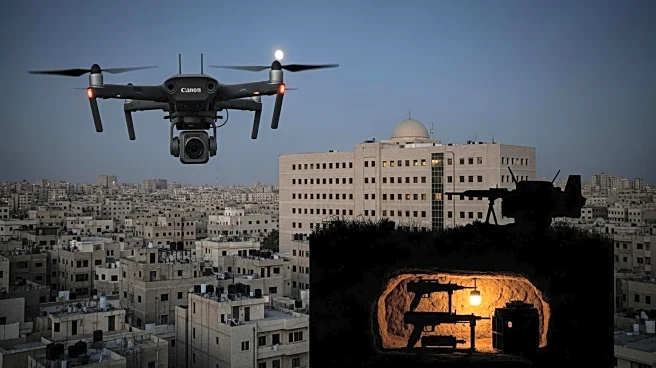What is the story about?
What's Happening?
The Israel Defense Forces (IDF) and the Shin Bet security agency have revealed the existence of an underground weapons workshop operated by Hamas near a hospital in Gaza City. This facility was discovered adjacent to a hospital complex managed by Jordanians. According to the IDF, the terrorist activities conducted by Hamas in this area occurred without the knowledge or involvement of the Jordanian authorities overseeing the hospital. The discovery highlights the use of civilian infrastructure by Hamas for military purposes, raising concerns about the safety and neutrality of medical facilities in conflict zones.
Why It's Important?
This revelation underscores the ongoing complexities and challenges in the Israel-Hamas conflict, particularly the use of civilian areas for military operations by Hamas. The proximity of the weapons workshop to a hospital managed by Jordanians could strain diplomatic relations and complicate humanitarian efforts in Gaza. It also raises significant concerns about the safety of medical facilities and the potential for civilian casualties in military operations. The international community, including humanitarian organizations, may need to reassess their strategies and safety protocols in conflict zones where such dual-use of infrastructure is prevalent.
What's Next?
The discovery may prompt increased scrutiny and security measures around civilian infrastructure in Gaza to prevent similar occurrences. It could also lead to diplomatic discussions between Israel, Jordan, and other stakeholders to address the implications of such findings. Humanitarian organizations operating in the region might need to enhance their coordination with local authorities to ensure the safety and neutrality of their operations. Additionally, this incident could influence future military strategies and operations in the region, with a focus on minimizing civilian impact.
Beyond the Headlines
The use of civilian infrastructure for military purposes by Hamas raises ethical and legal questions about the conduct of warfare and the protection of non-combatants. It challenges the principles of international humanitarian law, which seeks to protect civilian lives and property during conflicts. This situation may lead to broader discussions on the enforcement of these laws and the responsibilities of non-state actors in conflict zones. The international community may need to consider new frameworks or mechanisms to address these challenges effectively.
















